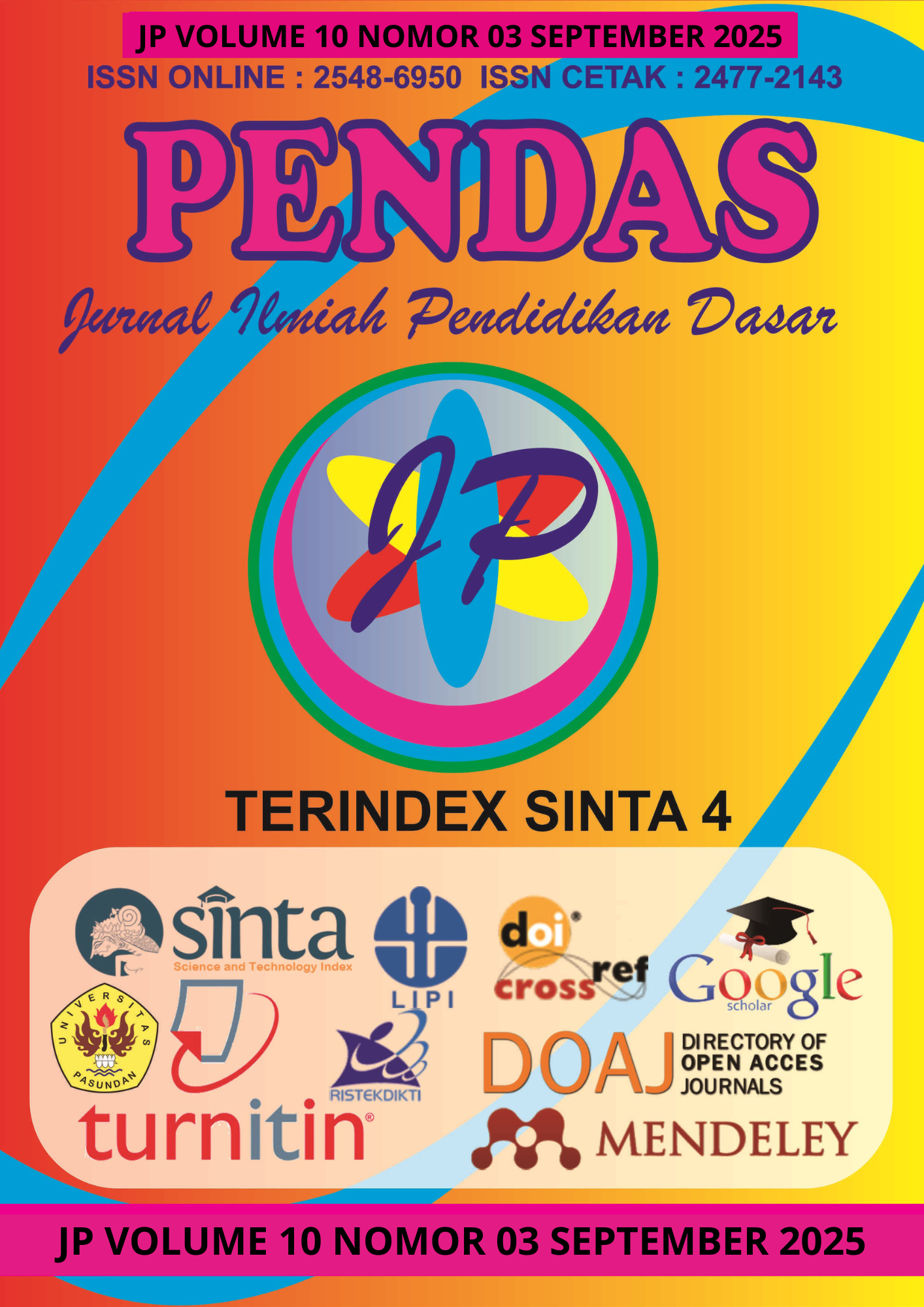PENGARUH MODEL PROBLEM BASED LEARNING BERBANTUAN MEDIA KARTU BILANGAN UNTUK MENINGKATKAN HASIL BELAJAR PESERTA DIDIK KELAS II DI SDN SEMERU 1 KOTA BOGOR
DOI:
https://doi.org/10.23969/jp.v10i03.27554Keywords:
Problem Based Learning, number cards, learning outcomesAbstract
This study aims to determine the effect of the Problem Based Learning (PBL) model assisted by number card media on the mathematics learning outcomes of second-grade students at SDN Semeru 1 Kota Bogor in the topic of place value. The research problem is based on the low understanding of place value concepts and the dominance of conventional teaching methods in the classroom. This study employed a quantitative approach using a quasi-experimental method with a One Group Pretest-Posttest design. The research subjects consisted of 25 students. The instruments used were pretest and posttest questions that had been validated by experts. The results showed an increase in the average score from 45.23 to 75.18 with a gain score of 64.89%, which is categorized as high. The t-test showed a t-value of 12.456 with a p-value of 0.000 (< 0.05), indicating a significant difference between the pretest and posttest results. The use of concrete media in the form of number cards effectively helped students understand abstract mathematical concepts, while the PBL model was able to increase active student engagement in the learning process. The findings conclude that the combination of PBL and number card media can significantly improve mathematics learning outcomes while providing a meaningful and contextual learning experience. Therefore, active, innovative, and contextual learning approaches are recommended to be implemented in primary school mathematics learning.
Downloads
References
Amri, H., Rifaldi, R., & Malik, A. (2025). Model Problem Based Learning dalam pembelajaran tematik terpadu di sekolah dasar. Jurnal Saraweta, 3(1), 61–75.
Ananda, E. R., Irawan, W. H., & Abdussakir, A. (2024). Strategi meningkatkan partisipasi siswa dalam pembelajaran berhitung matematika melalui penggunaan game edukasi kartu pintar. Al Madrasah: Jurnal Pendidikan Madrasah Ibtidaiyah, 8(3), 1238. https://doi.org/10.35931/am.v8i3.3634
Anggraeni, D. N. C., Afandi, M., & Jupriyanto. (2025). Model pembelajaran IPA terintegrasi PBL, TaRL, dan CASEL: Studi kasus kontekstual di sekolah dasar. Pendas: Jurnal Ilmiah Pendidikan Dasar, 10(2), Article 2. https://doi.org/10.23969/jp.v10i2.24555
Antono, D. P., Ismiyanti, Y., & Afandi, M. (2025). Efektivitas pendekatan Culturally Responsive Teaching (CRT) berbasis TPACK terhadap hasil kognitif peserta didik di sekolah dasar. Jurnal Pendidikan Dasar Flobamorata, 6(2), Article 2. https://doi.org/10.51494/jpdf.v6i2.2045
Astutik, S. (2022). Peningkatan Kemampuan Numerasi Melalui Problem Based Learning (PBL) Pada Siswa Kelas Vi Sdn Oro-Oro Ombo 02 Kota Batu. Jurnal Pendidikan Taman Widya Humaniora, 1(3), Article 3.
Fadilah, A. S., Irawan, D., & Kristianto, A. (2025). Model Problem Based Learning berbasis Educaplay pada pelajaran IPAS dalam peningkatan keterampilan bernalar kritis siswa. Jurnal Riset Pendidikan Dasar (JRPD), 29–35. https://doi.org/10.30595/jrpd.v6i1.24096
Irnelia, V. R., Agustina, D. A., & Asriyanti, F. D. (2025). Pengaruh pemahaman konsep siswa terhadap penerapan pembelajaran berdiferensiasi berdasarkan gaya belajar di Sekolah Dasar Tulungagung. Journal of Innovation and Teacher Professionalism, 3(3), Article 3. https://doi.org/10.17977/um084v3i32025p654-666
Lapasere, S., Julianti, N., Herlina, H., Rizal, R., & Guci, A. A. J. (2025). Pembelajaran tanggap budaya (Culturally Responsive Teaching) di kelas IV sekolah dasar. Attadrib: Jurnal Pendidikan Guru Madrasah Ibtidaiyah, 8(1), 98–112. https://doi.org/10.54069/attadrib.v8i1.859
Maria, R., Rifma, R., & Syahril, S. (2021). Efektivitas pembelajaran dan pembinaan karakter di masa pandemi Covid-19. Edukatif: Jurnal Ilmu Pendidikan, 3(4), 1503–1512.
Multahada, N., Fauza, Z. S., & Zuliana, E. (2025). Penggunaan media papan nilai tempat dalam pendekatan PMRI untuk mendukung pembelajaran matematika di sekolah dasar. Linear: Jurnal Ilmu Pendidikan, 9(1), Article 1. https://doi.org/10.53090/j.linear.v9i1.835
Mulyasari, W., & Fahrozy, F. P. N. (2023). Pemahaman konsep pada nilai tempat di sekolah dasar. Jurnal Elementaria Edukasia, 6(2), 442–452. https://doi.org/10.31949/jee.v6i2.5295
Sihaloho, S. M., & Saragih, M. J. (2024). Penerapan model Problem Based Learning untuk meningkatkan kemampuan berpikir kritis siswa pada pembelajaran matematika. JOHME: Journal of Holistic Mathematics Education, 8(1), 101. https://doi.org/10.19166/johme.v8i1.8270
Sitorus, N. P., Lubis, R., & Siregar, L. N. K. (2025). Analisis kesulitan belajar siswa dalam menyelesaikan soal cerita matematika yang ditinjau dari hasil belajar siswa kelas IV SDN 117858 Teluk Binjai. Katalis Pendidikan: Jurnal Ilmu Pendidikan dan Matematika, 2(2), 195–207. https://doi.org/10.62383/katalis.v2i2.1658
Tasya, N. A. (2025). Pengembangan Kurikulum Berbasis Kontekstual Untuk Meningkatkan Kualitas Pembelajaran Di Era Merdeka Belajar. Jurnal Pendidikan Dan Studi Islam, 1(01), Article 01.
Wijaya, I. G. B. M., Wibawa, K. A., & Suwija, I. K. (2025). Pengaruh Project-Based Learning berbantuan PPT interaktif terhadap kemampuan berpikir kreatif siswa dalam sistem persamaan linear dua variabel. Kognitif: Jurnal Riset HOTS Pendidikan Matematika, 5(1). https://doi.org/10.51574/kognitif.v5i1.2806
Downloads
Published
Issue
Section
License
Copyright (c) 2025 Pendas : Jurnal Ilmiah Pendidikan Dasar

This work is licensed under a Creative Commons Attribution 4.0 International License.



















